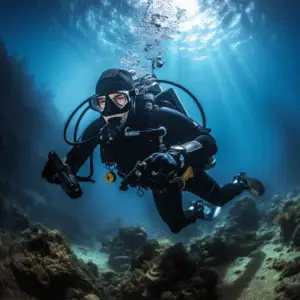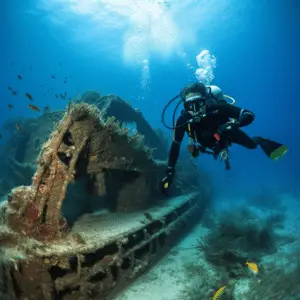Introduction to Scuba Diving Tips
Scuba diving tips into the depths of the ocean and experience the exhilarating activity of scuba diving. But before you take the plunge, it’s important to know some essential tips.
- Have a buddy with you for extra safety.
- Make sure your gear is well-maintained and functioning optimally.
- Respect your body’s limits.
- Master buoyancy control.
- And reap the health benefits.
Follow these tips for a safe and enjoyable dive!
Essential Equipment for Scuba Diving
To ensure a successful scuba diving experience, equip yourself with the right gear. Choosing the right scuba gear is crucial, as it directly impacts your comfort, safety, and overall diving performance. This section focuses on the importance of selecting the appropriate equipment, providing valuable insights to enhance your scuba diving journey.
Choosing the Right Scuba Gear
Choosing the right scuba gear is key for an amazing and safe diving experience. You’ll need reliable gear that fits your needs. Here’s the essential gear to consider:
- Dive Mask: A good fit stops water from entering eyes and nose.
- Snorkel: Allows you to breathe on the surface without removing the mask.
- Dive Fins: Gives you propulsion and stability while underwater.
- Regulator: Allows you to breathe air from the tank at a controlled rate.
- Buoyancy Control Device (BCD): Helps maintain neutral buoyancy.
- Dive Computer: Measures depth, time and calculates decompression limits.
These are just some of the essentials. Depending on preferences and environment, you may need wetsuits, gloves, or a dive knife.
Fun fact: The modern scuba regulator was invented by Émile Gagnan and Jacques Cousteau in 1943! This made underwater exploration easier and set the foundation for modern scuba diving. So remember: diving without safety is like taking a dip in a shark tank wearing a meat suit.
Safety Precautions and Best Practices
To ensure safety and enhance your scuba diving experience, follow these tips for safety precautions and best practices. Start by understanding the importance of proper buddy check and communication, along with other essential sub-sections. These guidelines will provide you with invaluable knowledge to ensure a safe and enjoyable scuba diving adventure.
Importance of Proper Buddy Check and Communication
Proper buddy check and communication are a must for safety in any environment. Following these practices minimizes risks and potential hazards during activities.
- Accountability: Proper buddy check creates accountability among those involved. It ensures everyone knows their responsibilities and is ready to help each other.
- Emergency Preparedness: With effective communication, buddies can share important info on emergency procedures, dangers and precautions. This allows for quick response and reduces accidents.
- Risk Reduction: Buddy checks identify and mitigate risks before they become serious. By voicing concerns or observations, hazards can be identified quickly, avoiding harm.
Besides, proper buddy checks should include equipment inspection and physical readiness. Communication requires clear instructions, active listening and mutual understanding.
A Pro Tip: To make buddy check system effective, set up a standard checklist covering all essential aspects of the activity or environment. Regular practice of this checklist ensures thoroughness and consistency.
Always remember: The only surprises you want on a dive are the underwater creatures, not your oxygen levels!

Planning and Executing a Successful Dive
To plan and execute a successful dive, equip yourself with scuba diving tips. Discover the importance of selecting dive sites and dive planning.
Selecting Dive Sites and Dive Planning
Choose the right dive site to plan a successful dive. Look at visibility, current strength, and marine life abundance. This ensures a safe and enjoyable experience.
| Factors | Importance Level |
|---|---|
| Water Visibility | High |
| Current Strength | Medium |
| Marine Life | High |
Do research before diving. Get to know the topography, potential hazards, and entry/exit points.
To make the dive better, follow these tips:
- Gather info. Ask experts or experienced divers about the best dive sites. Read reviews online.
- Check the weather. Make sure it’s safe for diving. Strong winds or storms can reduce visibility.
- Plan your dive. Set maximum depth, bottom time, start/end times, air consumption, surface intervals, and emergency procedures.
- Use the buddy system. Communicate plans. Watch each other throughout the dive.
Select the dive site carefully. Do thorough research. Plan well. Buddy up. Increase chances of a successful dive while staying safe and having fun.

